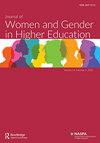But We Stopped All This : Stopping Practices of Women Full Professors in Neoliberal Times
Q2 Social Sciences
Journal of Women and Gender in Higher Education
Pub Date : 2023-10-23
DOI:10.1080/26379112.2023.2239413
引用次数: 0
Abstract
AbstractIn this article, I present how some women full professors have implemented stopping practices, thus setting limits to their academic work in a neoliberal context. From semi-structured and in-depth interviews with three women professors at the National University of Colombia, this research presents their stopping practices: saying “No” when asked to take on more academic responsibilities and refusing to work outside working hours, as well as distancing themselves from electronic devices that could keep them connected to their academic work outside office hours. Stopping is a gradual process that led them to set limits on the time they devoted to work, which revealed that their subjection to neoliberal governmentality was not total. Nevertheless, stopping was also a luxury since these women professors could do so thanks to their job and economic stability, academic prestige, and the privilege of their seniority. As such, I explain how stopping is both a privilege and a form of resistance to neoliberal productivist demands that has various implications for policy, practice, and future research. ACKNOWLEDGEMENTSI want to thank Salma Vásquez for proofreading the manuscript. I also thank Serhat Tutkal for all his support.DISCLOSURE STATEMENTNo potential conflict of interest was reported by the author(s).但我们制止了这一切:制止新自由主义时代女性正教授的做法
在这篇文章中,我介绍了一些女性正教授如何实施停止实践,从而在新自由主义背景下为她们的学术工作设定了限制。通过对哥伦比亚国立大学三位女教授的半结构化和深度访谈,本研究展示了她们停止的做法:当被要求承担更多的学术责任时说“不”,拒绝在工作时间之外工作,以及远离电子设备,因为电子设备可以使她们在办公时间之外与学术工作保持联系。停止是一个渐进的过程,导致他们对自己投入工作的时间设定限制,这表明他们对新自由主义治理的服从并不是完全的。然而,停下来也是一种奢侈,因为这些女教授可以停下来,这要归功于她们的工作和经济稳定、学术声望和资历的特权。因此,我解释了为什么停止既是一种特权,也是对新自由主义生产主义要求的一种抵抗形式,这对政策、实践和未来的研究有各种影响。我要感谢Salma Vásquez对手稿的校对。我还要感谢塞尔哈特·图特卡尔的一切支持。披露声明作者未报告潜在的利益冲突。
本文章由计算机程序翻译,如有差异,请以英文原文为准。
求助全文
约1分钟内获得全文
求助全文
来源期刊

Journal of Women and Gender in Higher Education
Social Sciences-Gender Studies
CiteScore
1.40
自引率
0.00%
发文量
20
 求助内容:
求助内容: 应助结果提醒方式:
应助结果提醒方式:


